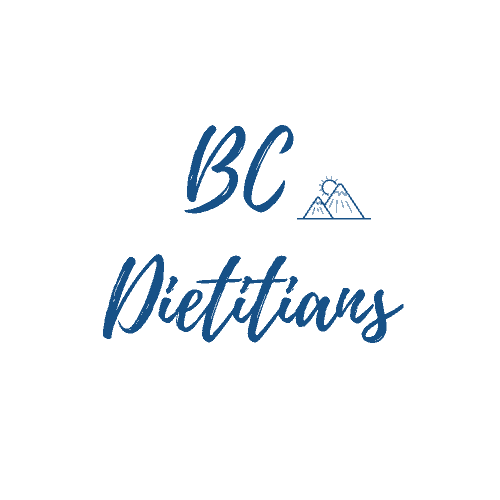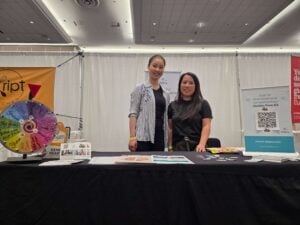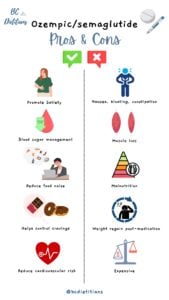PCOS has been called “one of the leading causes of female infertility.”
The symptoms of PCOS can be both disruptive and uncomfortable; many women feel they don’t belong to their bodies.
The World Health’s Organization estimated that at least 8-13% of women have PCOS with up to 70% remaining undiagnosed.
PCOS is a complex hormonal syndrome that can lead to a wide range of symptoms, including irregular periods, excess hair growth, acne, weight gain, and difficulty losing weight.
PCOS can affect your entire body, not just the ovaries!
The condition is often associated with fertility issues but it also leads to other chronic health problems such as high blood pressure, insulin resistance, heart disease, and sleep disorders.

Letisha Hodges, RD
PCOS and IBS: What's the Deal?
Studies have found that 12-29% of women with PCOS also have IBS. One study found that the subtype of IBS, predominately constipation IBS, was higher in women with PCOS compared to other subtypes of IBS.
The only differences in weight or bloodwork between women with PCOS and IBS vs. women with just PCOS were that women with PCOS and IBS were a little older, had lower levels of TSH (thyroid-stimulating hormone), and higher frequency of metabolic syndrome.
More research needs to be done in this area of research and women’s health.
Should you get food sensitivity and allergy testing?
I get it. Everything you eat seems to make you feel worse and you aren’t sure which foods are the triggers. And you are sick and tired of feeling sick and tired! If someone told me that they had the solution to my woes, I would hop on that too!
Unfortunately, food intolerance or sensitivity testing does not have solid evidence of accuracy.
First off, it is helpful to understand the difference between a food allergy and food intolerance:
- A food allergy is when your body reacts to a substance as if it was a bacteria or virus that would make you sick (i.e an inappropriate immune response).
When you eat the food you are allergic to, your body makes a certain type of antibodies called IgE (immunoglobin E) which triggers the immune system to go into overdrive.
Symptoms range from super severe (anaphylactic shock) to oral inflammation or diarrhea.
Common food allergens are wheat, soy, nuts, dairy, eggs, shellfish, and fish.
- A food intolerance actually does not involve the immune system like an allergy but it does cause an unpleasant reaction in the body, often in your gut, from a decreased ability to digest the food.
For example, the symptoms of lactose intolerance are caused by an insufficient amount of lactase (an enzyme that breaks down lactose) in the body.
Since your body cannot break down lactose, it just hangs out in your intestines and ferments which causes the symptoms of bloating, abdominal distention, cramping or pain, and diarrhea.
Should you get a food intolerance test for IBS?
If you are concerned about having the highest accuracy tests & results, nope!
Since food intolerances do not involve the immune system, the tests that are offered are not worthwhile.
The tests offered are called Food-specific IgG antibody testing which just measures the IgG antibodies in your blood. It sounds great until you learn that your body makes IgG antibodies to the proteins from the food you regularly eat.
In other words, it is a normal part of your immune system and high levels of IgG antibodies in the foods they commonly eat are found in people without food sensitivities!
Essentially you are just taking a test to find out which foods you eat the most often.
The downside is that you will then be instructed to avoid those foods which are your favourite, may not be a trigger food for your stomach woes, and are even healthy for you!
My Nutrition Treatment Plan for Women With Polycystic Ovary Syndrome (PCOS)
In any assessment with women, I am screening for signs of high androgen levels and high insulin levels.
If I ever have concerns, I make recommendations for women to discuss their symptoms with their primary care provider since I cannot make any diagnoses as a Registered Dietitian.
My goal is to treat PCOS in a holistic manner, help my clients navigate the healthcare system, and receive treatment for the “whole” of the condition vs. only 1 side such as fertility.
I also try to help women understand their condition in a more thorough way, dispel any diet myths, and develop some compassion for themselves.
It is a tough condition that is difficult to manage, beating yourself up or working with a health care provider who shames you in addition to these struggles is the last thing you need.
So if the IgG test food intolerance is not the most accurate, how do you find out your food sensitivities?
It isn’t the sexiest answer but working with a PCOS Dietitian to determine your food or lifestyle triggers – which may include a food elimination diet.
I help clients identify their food triggers for IBS through a systematic removal & reintroduction of potential triggers to determine the culprit of their symptoms!
Since food intolerances can range in severity, we need to find whether it is a food that should be avoided most of the time or if it is a dose-related response (meaning 1 serving a day is fine but not multiple).
My process for determining food sensitivities is to help clients find as many different foods they CAN eat without triggering their symptoms or being stuck on a restrictive diet!
The elimination diets can be restrictive (meaning less variety of healthy & fun foods) and overwhelming so I highly recommend you reach out to a Dietitian to guide you through it!
For my clients with IBS and PCOS, it is important to determine food intolerances if they are struggling with PCOS and bowel problems as many of the foods I would recommend to women with PCOS to help balance their blood sugar include whole grains, beans, lentils, soy, vegetables, and fruit.
However, these foods can also worsen gut health symptoms for those IBS & PCOS.
If you were unaware of your trigger foods and you added a bunch of the foods I mentioned above, this can be a barrier to sticking with a healthy diet!
Helping my clients determine which foods they can eat without pain or discomfort is very important!
I also may refer clients to a physiotherapist for pelvic floor treatment as pelvic floor health impacts IBS symptoms as well!
Working with a PCOS Dietitian
If you think you may have PCOS or IBS, it’s important to get diagnosed as early as possible so you can start treatment.
A holistic approach to treating PCOS is often the most successful, and I would be happy to chat with you about which treatment option might be best for you.
Don’t suffer in silence – schedule a free consultation with a Registered Dietitian today!








Add a comment